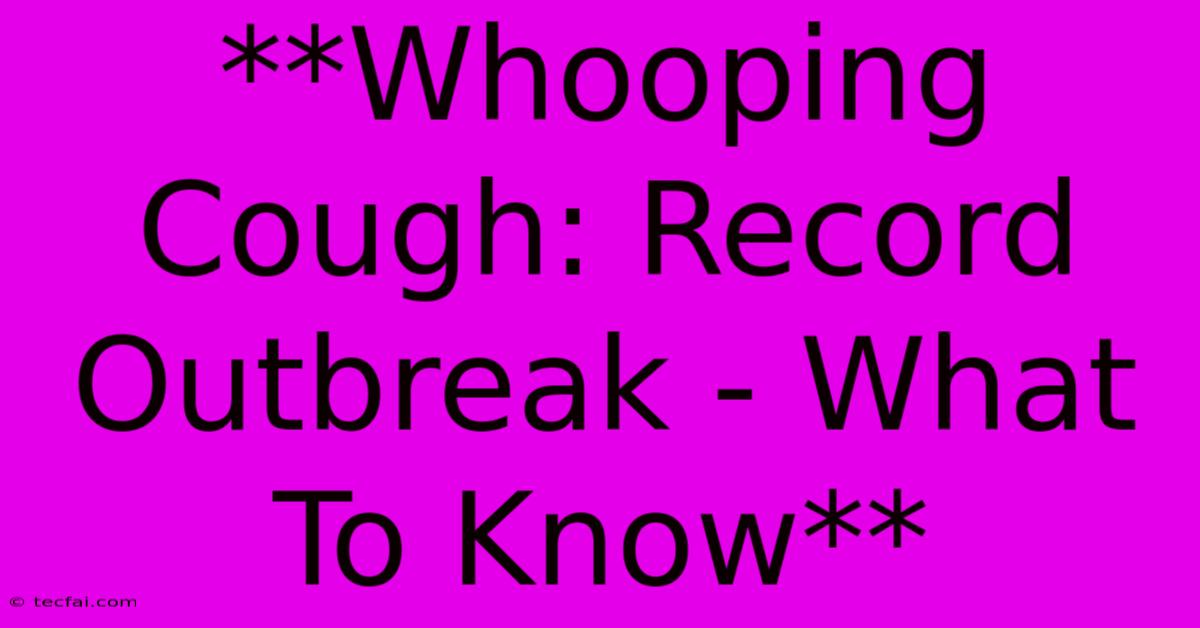**Whooping Cough: Record Outbreak - What To Know**

Discover more detailed and exciting information on our website. Click the link below to start your adventure: Visit Best Website tecfai.com. Don't miss out!
Table of Contents
Whooping Cough: Record Outbreak - What To Know
The United States is facing a concerning surge in whooping cough cases, a highly contagious respiratory illness that can be particularly dangerous for infants and young children. This recent outbreak has pushed public health officials to urge increased awareness and vaccination efforts.
What is Whooping Cough?
Whooping cough, also known as pertussis, is caused by the bacterium Bordetella pertussis. It is characterized by severe coughing spells that can last for weeks, often followed by a high-pitched "whoop" sound when inhaling.
Why is there a Record Outbreak?
Several factors contribute to the current whooping cough outbreak:
- Declining vaccination rates: While the pertussis vaccine is highly effective, some individuals choose not to vaccinate their children due to misconceptions or concerns.
- Waning immunity: Even with vaccination, immunity can wane over time, requiring booster doses.
- Increased susceptibility: Infants under 6 months old are particularly vulnerable as they are too young to be fully vaccinated.
Symptoms of Whooping Cough
Symptoms of whooping cough can vary depending on age and severity:
- Early stage (catarrhal stage): Mild cold-like symptoms, including runny nose, sneezing, low-grade fever, and mild cough.
- Paroxysmal stage: Severe coughing spells, often followed by a high-pitched "whoop" sound. Vomiting, exhaustion, and difficulty breathing may also occur.
- Convalescent stage: Coughing gradually lessens, but may persist for several weeks.
Who is at Risk?
While anyone can contract whooping cough, some individuals are more vulnerable:
- Infants under 6 months old: They are at highest risk for serious complications, including pneumonia, seizures, brain damage, and even death.
- Unvaccinated or under-vaccinated individuals: Those who haven't received the recommended pertussis vaccine are more susceptible to infection.
- Individuals with weakened immune systems: People with conditions like HIV/AIDS or undergoing chemotherapy are at increased risk.
How is Whooping Cough Spread?
Whooping cough spreads easily through airborne droplets released when an infected person coughs or sneezes. It can be transmitted even if the infected person doesn't show symptoms.
How is Whooping Cough Treated?
Antibiotics are used to treat whooping cough and prevent its spread. However, they are most effective in the early stages of the disease. Supportive care, such as oxygen therapy, may also be required.
What can I do to Prevent Whooping Cough?
The best way to protect yourself and your loved ones from whooping cough is through vaccination:
- Vaccination: All children should receive the pertussis vaccine according to the recommended schedule. Adults should also get booster doses, especially those who are in close contact with infants.
- Practice good hygiene: Wash hands frequently, cover coughs and sneezes, and avoid close contact with people who are sick.
- Stay informed: Keep up-to-date on recommendations from public health officials.
The current whooping cough outbreak serves as a reminder of the importance of vaccination and preventative measures. By understanding the risks and taking appropriate steps, we can all contribute to protecting ourselves and our communities from this serious disease.

Thank you for visiting our website wich cover about **Whooping Cough: Record Outbreak - What To Know**. We hope the information provided has been useful to you. Feel free to contact us if you have any questions or need further assistance. See you next time and dont miss to bookmark.
Featured Posts
-
Dismissed By Ten Hag Amad Leads Man United Win
Nov 08, 2024
-
Sunny And Windy Wind Chills Arriving
Nov 08, 2024
-
Shamrock Rovers Rally Past The New Saints
Nov 08, 2024
-
Biden 2024 Speech Date And Details
Nov 08, 2024
-
Skoda Monte Carlo Editions Fabia Scala Kamiq
Nov 08, 2024
